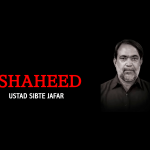By Jerrmein Abu Shahba
Among the serious diseases affecting our communities nowadays is the vice of slandering and making false accusations to others blindly. It is a fact that every family has its own issues and set of problems and there is no one who possesses a life devoid of challenges and conflicts. Some families have financial problems to deal with, and some are in trouble with the law. Some are struggling to pass their exams in school while others are facing challenges in their professional work environment. There are also some others who are facing social or family issues such as marital conflicts where a relationship is in distress or going downhill. In each and all of these situations, there is no person more knowledgeable about the reality of the struggle or the conflict except the ones who are going through it.
Unfortunately nowadays, we run into many situations where individuals of a community hear of a conflict such as a social problem at the local Masjid or a marital conflict and they get bits and pieces of information here and there from one source or one side. And for them it is enough and all they need is to make a hasty judgment and think negatively of others based on the incomplete information they received. Not only that, some take it even a step further and go out of their way to declare and announce their judgment to community members and social media ignorantly believing that they are doing Amr bil Ma’roof (adjoining the good) and Nahy ‘an Al Monkar (forbidding the evil). But little do they know that by their hasty judgment and act of slandering others, they are doing a greater evil that the conflict at hand which could be contained and handled in a private and civilized manner. We must not believe everything we hear and we must not rush to judgment just because he or she said or the whole community is talking about it. As Allah (SWT) commanded, “O you who have believed, if there comes to you a disobedient one with information, investigate, lest you harm a people out of ignorance and become, over what you have done, regretful.” [49:6]
Unless we have the capability of fully investigating and we have succeeded in completing an unbiased investigation, it is not our right to make a judgment. And even if we have made a judgment based on a full and just investigation, it is not our right to publicize that judgment which may hurt one party or another.
Allah says in the Quran: “O you who believe! Avoid much suspicion, in deeds some suspicions are sins. And spy not neither backbite (Gheebah) one another. Would one of you like to eat the flesh of his dead brother? You would hate it (so hate backbiting). And fear Allah, verily, Allah is The One Who accepts repentance, Most Merciful” (49: 12)
In this verse, Allah (SWT) strongly forbids backbiting, and he compares the backbiter to one who eats the flesh of his dead brother. If he would hate eating the flesh of his brother, he should also hate to eat his flesh while he is alive by backbiting and slandering him. When one reflects deeply over this assimilation it will be enough to keep one away from backbiting. Bear in mind that backbiting is not permitted even if the information being passed on is truth. Then imagine if the backbiter is passing on false information that hurts the reputation of others! The sin is greater than eating the flesh of your own dead brother!
It is narrated that Prophet Mohammad (SA) said to his companions: “Do you know what backbiting is?” They said, “Allah and His Messenger know best.” He then said, “It is to say something about your brother that he would dislike.” Someone asked him, “But what if what I say is true?” The Messenger of Allah said, “If what you say about him is true, you are backbiting him, but if it is not true then you have slandered him.”
When it comes to marital issues between a couple, it is highly advised in Islam that the two parties seek support from a trusted and wise mediator in the community from both sides who can help reconcile their differences for the purpose of bringing peace between them. In order for this to take place, the mediators must listen to both sides and give both parties the opportunity to express their position so that the process of reconciliation and resolution can take place. However, often times we find that these ‘mediators’ whether it be family members or community members listen only to one side of the story and attempt to seek reconciliation with a pre-judgment already, hence the reconciliation never happens because things didn’t take the right course.
The intention may be good and sincere, but the lack of wisdom and judgment in the matter causes them to act in the wrong direction and cause more harm than good. Furthermore, while it is good and encouraged to step in to help reconcile between two parties, there are conditions and limits to how far one should step in and get involved. Giving one-sided advice based on the premonition that the subject at hand is a victim may cause them to give advice and encouragement to them that is actually harming the possibility of reconciliation and causing permanent damage to it.
When a couple is facing marital issues, as much as it is recommended for close family members and the wise among the community members to get involved and help reconcile between them, it is also necessary to give the husband and wife the proper space, time and privacy to sort out their issues, negotiate their differences, and reach a mutual resolution. At the end of the day, no one can understand the situation or know the complete truth of the circumstances as much as the couple themselves, especially when the outside world has not fully investigated the matter in its entirety. On the Day of Judgment, we will all be asked about our actions and the consequences of our actions. And we will have to answer if we caused any damage to the reputation of others by propagating false talk or even truthful talk that harms and slanders others. One of the irreversible damages is the damage done to the reputation of others and if we are guilty of doing so, then we must seek repentance by first apologizing to those whom we have harmed by our propagation of negative information about them. Next we must make every effort to undo the harm we have done by attempting to repair the reputation of those we have destroyed, although unfortunately this is a difficult task and hence abstinence from such sin is best.
It is important to note that without proper steps for repentance and giving back the rights (huqooq) of the people who were slandered, there is no doubt that there will be no blessings (barakat) for those who transgress over the rights of overs. The perilous effects of their actions will soon be seen not just in the Akhira, but also in this Dunya!
Among the attributes of Allah (SWT) is Haleem (clement and forbearing) and Sattar (concealer). And we should take example in that and it is the best of manners (Akhlaq) to keep the personal affairs and any negative information we find out about others (whether true or not) as confidential. It goes without saying that we should treat others as we would like to be treated and surely there are matters in our own lives that we may be ashamed of telling others and would like to keep it an internal matter. Hence, just as we would like our matters to stay without our homes, let us give that same right of privacy and respect to others. That is the least that we can do if we are not able to assist in a positive and objective manner. Let us take example of the excellent and pure Akhlaq of our Holy Prophet Muhammad (SA) as he is the exemplar and role model of great manners and morals and if we have any doubt of what is right and what is not, we should question ourselves whether the Prophet (SA) would act in such a way or not and we will surely find guidance from this immaculate personality and his blessed infallible progeny. May Allah (SWT) enable us to cleanse and purify our intentions and actions and align them with the school of the AhlulBayt (AS) and Infallible Imams (AS)!









